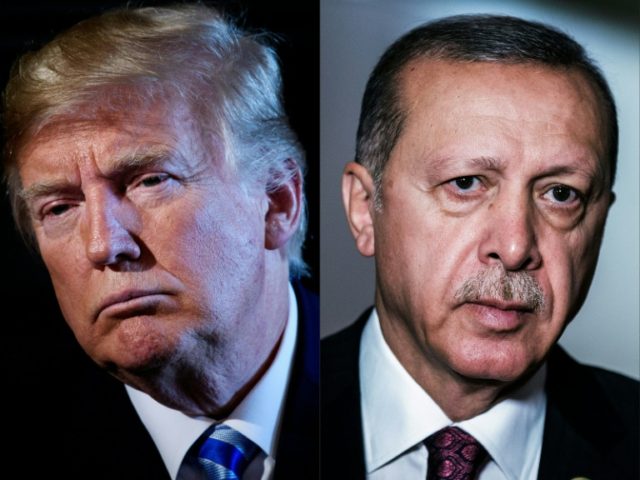Turkish President Recep Tayyip Erdogan offered himself as a potential mediator between Russia and Ukraine on Thursday after reportedly discussing tensions between the two countries with President Donald Trump this week.
Erdogan and Trump are expected to meet at this weekend’s G-20 summit in Buenos Aires, Argentina. Trump canceled a scheduled meeting with Putin on Thursday over continued hostilities towards Ukraine.
Russia invaded and illegally annexed Ukraine’s Crimea peninsula in 2014 while maintaining rebel troops in the nation’s eastern Donbas region. Last year, construction began on a bridge connecting Crimea to Russia over the Kerch Strait, the mouth of the Sea of Azov, around which lie several of Ukraine’s most important ports. The Russians built the bridge in a way that made it impossible for ships leaving Ukrainian ports like Mariupol to exit out to the Black Sea and vice versa.
This weekend, Russia denied a fleet of Ukrainian ships entry through the Kerch Strait, seized the ships, and detained their crew. Moscow has refused to return the ships or the crew members, despite Ukrainian authorities having reportedly informed the Russians in Crimea that the ships intended to cross into the Sea of Azov. Ukraine has since declared martial law and implored the international community to intervene before Russian fighters seize more territory.
Turkey’s Hurriyet newspaper reported on Wednesday that Trump and Erdogan discussed the dispute in Black Sea on Wednesday. Turkey comprises most of the land south of the Black Sea and controls the other most important strait in the sea, the Bosphorus. It has also struggled to maintain civil relations with Russia, seeking weapons aid and trade benefits from bilateral ties despite being on opposite ends of the Syrian civil war.
According to Hurriyet, the Turkish presidential office announced that Trump and Erdogan agreed to meet at this weekend’s G-20 summit. Erdogan spoke to Trump after speaking to Russian President Vladimir Putin and Ukrainian President Petro Poroshenko and briefed the American head of state on his conversations with the two. The statements did not offer any specifics on what the two presidents discussed.
On Thursday, Erdogan stated publicly that he hoped Turkey could find a role as a “mediator” between Ukraine and Russia.
“Both Mr. Putin and Mr. Poroshenko in our talks made requests. We will convey the [Ukrainian] demands to Mr. Putin in our meeting in Argentina,” Erdogan told reporters, noting that he expected to have a further conversation with Trump about the issue in Argentina. “Here we could take on a mediator role and we have discussed this with both sides.”
Relations between Putin and Erdogan have been volatile for years. Both sides appear interested in boosting economic ties, as Russian tourism to Turkey has traditionally netted the Turkish government significant profits. Conversely, Turkey is interested in purchasing Russian military technology, particularly its S-400 surface-to-air defense system. Purchasing the system would violate NATO protocol, of which Turkey is a member, as the Russian system is not interoperable with the missiles that other NATO member countries use. Erdogan has insisted on purchasing the Russian technology, anyway.
Tensions between the two countries have revolved largely around Turkey’s role in the Syrian civil war. Russia is the largest ally of dictator Bashar al-Assad, who Erdogan has repeatedly vowed to oust from power. Russia has nonetheless included Turkey in “peace talks” between Russia and Iran, both of whom are on the same side of the war. Syrian rebel groups have not formed a significant part of the Russian-led talks, rendering their effect minimal. Relations have improved since 2016, however, when the Turkish military shot down a Russian jet it claimed had crossed out of Syria into Turkish airspace.
In addition to geographical proximity, Turkey has a stake in the Russia-Ukraine dispute because Kiev is working to convince NATO countries to intervene. In an interview with Germany’s Bild newspaper, Poroshenko urged NATO to deploy to the Sea of Azov.
“Putin wants the old Russian empire back. Crimea, Donbass, the whole country,” Poroshenko argued. “As Russian tsar, as he sees himself, his empire cannot function without Ukraine. He sees us as his colony.”
NATO responded by noting that it already maintains a significant presence in the Black Sea but would continue to monitor the situation.

COMMENTS
Please let us know if you're having issues with commenting.